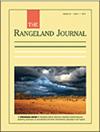放牧的未来:从澳大利亚昆士兰州西部牧场社区的当代合作推广项目中学习
IF 0.9
4区 环境科学与生态学
Q4 ECOLOGY
引用次数: 5
摘要
生产商依赖干旱补贴,而不是在少雨年份积极规划和及时去库存,这促使昆士兰州政府投资于促进商业和抗旱能力。放牧期货(2016-2022年预算600万澳元)是一个扩展项目,重点是提高澳大利亚昆士兰州西部粗放型畜牧业生产者的商业管理技能。该地区牧场的生产力正在下降,面积达100万平方公里,由经营2400多家牲畜企业(牛肉、绵羊和山羊)的放牧人管理。昆士兰州农业和渔业部与区域自然资源管理组织和其他公共和私人组织合作,将放牧期货作为干旱和气候适应计划的组成部分。项目交付强调提高多机构工作人员和牲畜生产者的技能,以促进在三个整体业务主题内的实践变革:(1)牧场管理;(2)动物生产;(3)人的业务。三次独立调查(2018年、2019年和2020年)表明,由于该项目,放牧企业正在发生积极的实践变化。尽管面临重大环境挑战,包括长期干旱(2013-2020年)、2019年的极端洪水事件和2020年的COVID-19大流行,牧场主仍推动了管理变革。本文详细介绍了“放牧未来”推广项目的基本原理、进展情况、面临的挑战和未来的发展方向。本文章由计算机程序翻译,如有差异,请以英文原文为准。
GrazingFutures: learnings from a contemporary collaborative extension program in rangeland communities of western Queensland, Australia
Producer reliance on drought subsidies instead of proactive planning and timely destocking in low rainfall years has prompted Queensland government investment in promoting business and drought resilience. GrazingFutures (AU$6 million budget, 2016-2022) is an extension project focussed on enhancing business management skills of extensive livestock producers in western Queensland, Australia. The region's rangelands are in productivity decline, span 1 million km2 and are managed by graziers operating more than 2400 livestock businesses (beef, sheep and goats). The Queensland Department of Agriculture and Fisheries delivers GrazingFutures as a component of the Drought and Climate Adaptation Program, in partnership with regional natural resource management groups and other public and private organisations. Project delivery emphasised upskilling multi-agency staff and livestock producers to promote practice change within three whole of business themes: (1) grazing land management;(2) animal production;and (3) peoplebusiness. Three independent surveys (2018, 2019, 2020) indicated positive practice change was occurring in grazing businesses as a consequence of the project. Graziers instigated management changes even under major environmental challenges including extended drought (2013-2020), an extreme flood event in 2019 and the COVID-19 pandemic in 2020. This paper details the rationale, progress against the objectives, challenges and future direction of the GrazingFutures extension project.
求助全文
通过发布文献求助,成功后即可免费获取论文全文。
去求助
来源期刊

Rangeland Journal
环境科学-生态学
CiteScore
2.90
自引率
8.30%
发文量
14
审稿时长
>36 weeks
期刊介绍:
The Rangeland Journal publishes original work that makes a significant contribution to understanding the biophysical, social, cultural, economic, and policy influences affecting rangeland use and management throughout the world. Rangelands are defined broadly and include all those environments where natural ecological processes predominate, and where values and benefits are based primarily on natural resources.
Articles may present the results of original research, contributions to theory or new conclusions reached from the review of a topic. Their structure need not conform to that of standard scientific articles but writing style must be clear and concise. All material presented must be well documented, critically analysed and objectively presented. All papers are peer-reviewed.
The Rangeland Journal is published on behalf of the Australian Rangeland Society.
 求助内容:
求助内容: 应助结果提醒方式:
应助结果提醒方式:


